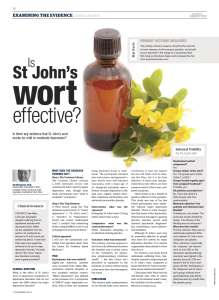 This article was published in Medical Observer.
This article was published in Medical Observer.
The article is also available on the Medical Observer website (may need registration).
Clinical scenario
I recently saw Rhys, a 29-year-old graphic designer suffering from an adjustment disorder with depressed mood, following the separation from his partner. He mentioned an interest in St John’s wort and wanted my advice. I knew that there was some supportive evidence for its use in major depressive disorder [1], but what about in the “minor” depressive disorders commonly seen in general practice?
Clinical question
What is the effect of St John’s wort on depressive symptoms in depressive disorders that do not meet the DSM criteria for major depressive disorder?
What does the research evidence say?
Step 1: The Cochrane Library
The Cochrane Library contains a 2008 systematic review that examines St John’s wort for major depression only, though most study participants had “mild to moderate” symptoms. [1]
Step 2: The Trip Database
A PICO search using the TripDatabase (search term: P: “minor depression”, I: “St John’s wort”, C: “placebo”, O: “depression”) found one recent randomised trial. [2] I couldn’t find something better using PubMed so let’s look at Rapaport et al. (2011) in detail. [2]
Critical appraisal
I will use the randomised controlled trial appraisal sheet from the Centre for Evidence Based Medicine. [3]
PICO
Participants: who was studied?
81 American patients were recruited from either Massachusetts General Hospital, or two academic medical centres. “Minor depression” was defined as the presence of two to four symptoms of DSM-IV major depression criteria, with at least one symptom being depressed mood or anhedonia. The participants included both men and women, and appeared to have mostly been well-educated Caucasians, with a mean age was 50 years. Important exclusions were a history of major depression in the past year, organic mental disorders, substance use disorders, and antisocial personality disorder.
Intervention: what was the exposure?
810 mg/day St John’s wort (270 mg tablet, three times a day)
Comparator: what was the control/alternative?
Either citalopram 20 mg/day, or an identical looking placebo.
Outcomes: what was measured?
The primary outcome appears to have been the difference between the baseline and 12 weeks scores of the “inventory for depressive symptomatology (clinician rated)” – but this choice isn’t described or explained in the methods. A variety of other rating scales were also used throughout the study.
Internal validity: are the trial results valid?
Randomised patient assignment?
Yes.
Groups similar at the start?
Yes. The groups were similar (Table 2, p. 935). [2]
Groups treated equally apart from assigned treatment?
Probably, yes.
All patients accounted for?
No. There was almost a 30% dropout rate from randomisation.
Measures objective? Or patients and clinicians kept blinded?
Probably yes, but unclear. The study was double-blinded by design. The efficacy of the blinding was not measured. [2]
What were the results?
Primary outcome: there was no statistically significant difference between St John’s wort, citalopram and placebo.
Other outcomes: numerically, the “response” (an improvement of over 50% on the depression symptomatology inventory) was highest in the placebo group (52.2%) and lowest in the St John’s wort group (38.5%). Participants in the citalopram and St John’s wort groups suffered more gastrointestinal side-effects (diarrhoea and dry mouth) than the placebo group.
Conclusion
This study is quite underpowered – we should make only cautious conclusions. It does not support the use of St John’s wort in someone like Rhys, but it is far from definitive. It seems clear that gastrointestinal side-effects are more common with St John’s wort compared to placebo.
There seems to be a dearth of quality evidence to this question. This study was one of the few where participants were explicitly without major depressive disorder. There is some recognition that much of the “depression” detected and managed in general practice matches poorly with classical psychiatric diagnoses, [4] but nonetheless, cause substantial morbidity. Although St John’s wort may be somewhat effective in people who meet the criteria for major depressive disorder [1], it is unwise to generalise these results to those who do not. For instance, one study found individuals suffering from “dysthymia” seemed to respond poorly to St John’s wort, compared to those with ICD-10 “mild or moderately severe depressed episode”. [5]
I discussed with Rhys that the risk-benefit ratio with St John’s wort in his situation wasn’t clear, but unlikely to be favourable.
Stat Facts
Primary outcome measures
The primary outcome measure should be the outcome of most relevance to the research question, and should be pre-specified in the design of a randomised trial. Not doing so introduces biases and increases the risk of an experimentwise error.
References
- Linde K, Berner MM, Kriston L. St John’s wort for major depression. Cochrane Database of Systematic Reviews 2008; Issue 4. Art. No.: CD000448. DOI: 10.1002/14651858.CD000448.pub3
- Rapaport MH, Nierenberg AA, Howland R, Dording C, Schettler PJ, Mischoulon D. The treatment of minor depression with St. John’s Wort or citalopram: failure to show benefit over placebo. Journal of Psychiatric Research 2011; 45(7): 931-941. DOI: 10.1016/j.jpsychires.2011.05.001
- RCT Appraisal Sheets. Centre for Evidence Based Medicine [website]. Retrieved on 2014 September 25. http://www.cebm.net/critical-appraisal/
- Hickie IB. Primary care psychiatry is not specialist psychiatry in general practice. Med J Aust 1999; 170: 171-173
- Randløva C, Mehlsenb J, Thomsena CF, Hedmanc C, von Fircksd H, Winther K. The efficacy of St. John’s Wort in patients with minor depressive symptoms or dysthymia – a double-blind placebo-controlled study. Phytomedicine 2006; 13(4): 215-221. DOI: 10.1016/j.phymed.2005.11.006

1 comments
Author
The first of a two-part video based on this article: